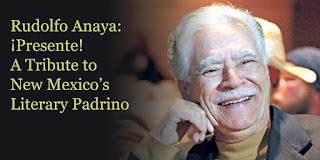Los Angeles Times June 20, 2020 by Nardine Saad
|
 |
Rudolfo Anaya, who wrote the classic Chicano coming-of-age novel “Bless Me, Ultima,” has died.
(Arenas Entertainment)
|
Author Rudolfo Anaya, who wrote the classic New Mexico-set novel "Bless Me, Ultima" and was revered as the dean of Chicano literature, has died. He was 82.
The self-taught author died Sunday at his home in Albuquerque, N.M., his niece Belinda Henry told the Associated Press on Tuesday.
Henry said that Anaya died after a long illness. She did not immediately respond to The Times' request for further comment.
The celebrated writer was awarded the National Humanities Medal by President Barack Obama in 2016 and accumulated a number of literary accolades during his career, including the Premio Quinto Sol National Chicano literary award, the 2007 Notable New Mexican Award, and the PEN Center USA West Award for Fiction for novel "Alburquerque."
His other works include "Zia Summer," "Rio Grande Fall," "Jalamanta," "Tortuga," "Heart of Aztlan," "The Anaya Reader" and the children's books "The Farolitos of Christmas" and "Maya's Children."
The New Mexico native's oeuvre has been praised for its embodiment of the New Mexican experience.
"Through his indelible stories, Rudolfo Anaya, perhaps better than any other author, truly captured what it means to be a New Mexican, what it means to be born here, grow up here and live here," Gov. Michelle Lujan Grisham tweeted Tuesday. "His life's work amounts to an incredible contribution to the great culture and fabric of our state -- not only through his prodigious literary contributions but through his decades as an educator at the University of New Mexico."
Anaya was born in the railroad town of Pastura, N.M., in 1937 and grew up in Santa Rosa. He graduated from Albuquerque High School, then began teaching in the city's public schools, writing n the evenings.
It was his wife, Patricia Lawless, whom he met in the 1960s, who inspired him to write his most famous novel, 1972's "Bless Me, Ultima," about a boy named Antonio Marez and the spiritual journey he embarks on when a healer named Ultima comes to stay with his family.
"The truly magical moment in the creative process was when Ultima appeared to me and instructed me to make her a character in the novel. Suddenly a boy's adventure novel became an intense exploration of the unconscious," the author wrote in his bio on Grand Central Publishing's website.
Ultima, Anaya said, was inspired by his wife, who read seven drafts of the semiautobiographical novel and shared her suggestions.
The book was set in 1940s rural New Mexico. The beloved tome still lands on the county's most-challenged books list for its depictions of violence, as well as a golden carp and the curandera -- based on paganism and witchcraft drawn from the state's indigenous history.
However, many New Mexico schools made it required reading, though it has been criticized by some conservative groups for promoting the overthrow of the federal government and was banned in Arizona.
The Chicano icon said the beliefs of his traditional New Mexican culture are grounded in the Catholic religion and Spanish folk tales from the Iberian world.
"These beliefs are influenced by cultural borrowings from the Pueblo Indian way of life. This culture is the backdrop for the novel," he said of "Bless Me, Ultima." "It is the way of life of the Nuevos Mexicanos that inspires my creativity. But a novel is not written to explain a culture, it creates its own. I create stories, so the reader must separate realistic portrayals of the culture from fiction."
The celebrated novel landed him squarely in the nascent Chicano movement of the 1960s and '70s. Anaya was invited to many university campuses and communities to speak about the novel. Anaya opened up a retreat in Jemez Spring, N.M., for aspiring Latino writers and, in 1974, began teaching creative writing at the University of New Mexico, where he had previously earned his bachelor's and master's degrees. He retired from the university in 1993.
"The entire UNM community mourns the passing of Rudolfo Anaya, one of the great voices not only of Chicano literature but of humanity," University of New Mexico President Garnett S. Stokes said in a statement to The Times.
"He wrote of New Mexico, and what it meant to be a New Mexican -- and did so in the same manner in which he lived his life: with passion, excitement, and conviction. During his long tenure as a teacher of writing at the University of New Mexico, he inspired countless students to find and raise their own voices, to take pleasure in reading as well as great joy in writing and self-expression," Stokes added. "His enthusiasm for his craft, as well as his unbreakable optimism, were infectious."
A spokesman for Grand Central Publishing told The Times that the publisher cherished having celebrated several momentous events with Anaya, from the inclusion of "Bless Me, Ultima" in NEA's Big Read program and the novel's adaptations as a feature film and an opera, to the naming of an Albuquerque public library after him and his receipt of the National Humanities Medal.
"We will miss his passionate commitment to his local community and community of writers, his humility and his sense of humor," the publishing house said.
 |
Rudolfo Anaya’s 1972 coming-of-age novel.
(Grand Central Publishing)
|
--The Associated Press contributed to this report.
Caption: PHOTO: THE 1972 novel has been banned but also was lauded by Laura Bush.
PHOTO: RUDOLFO ANAYA, author of novel "Bless Me, Ultima," said the title character was inspired by his wife and the story by his native New Mexico, where it was set.











